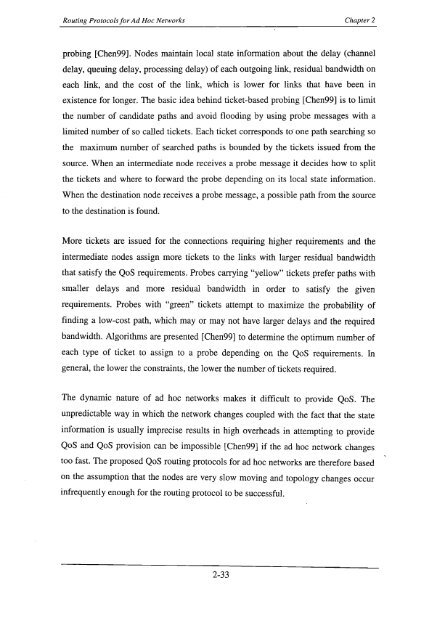Gugrajah_Yuvaan_ Ramesh_2003.pdf
Gugrajah_Yuvaan_ Ramesh_2003.pdf
Gugrajah_Yuvaan_ Ramesh_2003.pdf
Create successful ePaper yourself
Turn your PDF publications into a flip-book with our unique Google optimized e-Paper software.
Routing Protocols for Ad Hoc Networks Chapter 2<br />
probing [Chen99]. Nodes maintain local state information about the delay (channel<br />
delay, queuing delay, processing delay) of each outgoing link, residual bandwidth on<br />
each link, and the cost of the link, which is lower for links that have been in<br />
existence for longer. The basic idea behind ticket-based probing [Chen99] is to limit<br />
the number of candidate paths and avoid flooding by using probe messages with a<br />
limited number of so called tickets. Each ticket corresponds to' one path searching so<br />
the maximum number of searched paths is bounded by the tickets issued from the<br />
source. When an intermediate node receives a probe message it decides how to split<br />
the tickets and where to forward the probe depending on its local state information.<br />
When the destination node receives a probe message, a possible path from the source<br />
to the destination is found.<br />
More tickets are issued for the connections requiring higher requirements and the<br />
intermediate nodes assign more tickets to the links with larger residual bandwidth<br />
that satisfy the QoS requirements. Probes carrying "yellow" tickets prefer paths with<br />
smaller delays and more residllal bandwidth in order to satisfy the given<br />
requirements. Probes with "green" tickets attempt to maximize the probability of<br />
finding a low-cost path, which mayor may not have larger delays and the required<br />
bandwidth. Algorithms are presented [Chen99] to determine the optimum number of<br />
each type of ticket to assign to a probe depending on the QoS requirements. In<br />
general, the lower the constraints, the lower the number of tickets required.<br />
The dynamic nature of ad hoc networks makes it difficult to provide QoS. The<br />
unpredictable way in which the network changes coupled with the fact that the state<br />
information is usually imprecise results in high overheads in attempting to provide<br />
QoS and QoS provision can be impossible [Chen99] if the ad hoc network changes<br />
too fast The proposed QoS routing protocols for ad hoc networks are therefore based<br />
on the assumption that the nodes are very slow moving and topology changes occur<br />
infrequent!y enough for the routing protocol to be successful.<br />
2-33
















